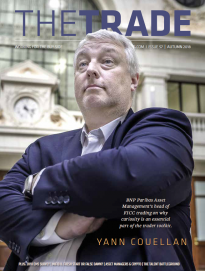
Industry opposes regulatory intervention for periodic auctions
The EU financial regulator has published responses to its call for evidence, revealing that the industry is firmly behind the use of periodic auctions.

The EU financial regulator has published responses to its call for evidence, revealing that the industry is firmly behind the use of periodic auctions.
Virtu has obtained certain regulatory approvals for ITG takeover with completion of the deal expected in the first quarter this year.
Scott Patrick brings 25 years’ experience to Dash and will lead the company’s financial planning and operations.
 Sponsored message from Cboe Europe
Sponsored message from Cboe Europe
David Howson, chief operating officer at Cboe Europe, on the revolution in block trading and how the firm stays in tune with customer needs.
Data from the Futures Industry Association (FIA) showed that equity index futures and options were a main driver for the record activity.
Symbiont has previously worked with Vangaurd to simplify its index data sharing processes using blockchain technology.
 MEMX: The road ahead
MEMX: The road ahead
Following news of major US players looking to establish a member-owned equities exchange, industry experts agree the move could prove to be positive for markets, but warn the road ahead for MEMX may be a difficult one.
READ MORE smartTrade Technologies: Basing crypto on the right technology platform
smartTrade Technologies: Basing crypto on the right technology platform
The choice of the trading platform technology on which to build your crypto business on is fundamental! John Stead, smartTrade’s head of PreSales, tells TRADE TV what the challenges are when it comes to selecting a cryptocurrency platform: www.smart-trade.net
WATCH VIDEO



The trading venue’s sales head will relocate to Paris to lead the MTF as CEO of newly-formed business, Aquis Exchange Europe.
LCH SA is targeting going live with a sponsored repo clearing scheme for the buy-side in 2019.
Market participants can access HKEX’s OTC Clear service for FX forward and swaps via Traiana’s CCP Connect.
Long-serving BNY Mellon executive with three decades of asset management experience, Nadine Chakar, joins State Street for second spell.
Godfried De Vidts is a recognised voice on European financial and political issues, having most recently served as director of European affairs at NEX Group.
FX trading firm LMAX Exchange has made two appointments to its sales team in Asia Pacific as it targets growth in the region.
Mark Makepeace will take on a non-executive chairman role as Waqas Samad succeeds him as director of the information services unit, which includes FTSE Russell.
Maarten Slendebroek will step down as CEO in March with the former co-CEO of Janus Henderson, Andrew Formica, due to take on the role.
PGGM is the first pension fund manager to centrally clear repos at German exchange group Eurex.
With a new wave of initial margin rules on the horizon, BNY Mellon says clients are already more prepared.
New State Street chief executive, Ron O’Hanley, begins the year by announcing job cuts in earnings release.